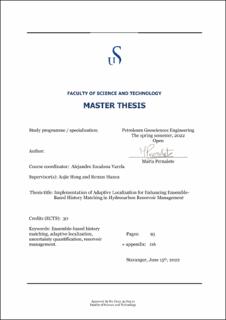| dc.description.abstract | In reservoir management, the ensemble-based history matching is applied to quantify and update uncertainty in reservoir characterization with the main objective to support high quality decisions. However, the ensemble-based history matching could suffer from statistical problems that make the ensemble unable to represent probability distributions and quantify uncertainty statistically-correctly. Localization can effectively solve the ensemble-based history matching problems. Localization weights the influence degree that observations have over model parameters in the analysis step of ensemble Kalman filter-based methods. In the non-adaptive localization scheme, the influence degree is fixed in time, and unimodal distributed for all types of observations and model parameters. Unlike the non-adaptive localization scheme, the adaptive localization scheme defines the influence degrees based on causality relationships among simulated observables and model parameters, so that the influence degrees can be time-variant, multimodal distributed, and dependent of reservoir dynamics and different types of model parameters and observations. The thesis lies in the research about the practical advantage of adaptive localization over non-adaptive localization schemes for ensembled-based history matching. The thesis is developed in five sections: i) generation of the initial ensemble; ii) development of an ensemble-based history matching without localization, the benchmark case, that applies ES-MDA; iii) selection of the best non-adaptive localization case, applying distance-based studies; iv) Selection of the best adaptive localization case, applying a denoising approach; and v) Comparative analysis among updated ensembles, defining selection criteria of the best ensemble-based history matching for the Reek field.
The main conclusion from the thesis work is that the history matching with the adaptive localization scheme overperformed the history matching with the non-adaptive localization scheme and the benchmark case (i.e., no localization) for the Reek field. Therefore, adaptive localization scheme can improve uncertainty quantification and decision quality in ensemble-based reservoir management.
The novelty of the thesis is that it has investigated the practical pros and cons of applying the adaptive localization scheme for ensemble-based history matching reservoir simulation models and proposed a general workflow to guide localization implementation and evaluation. The thesis work has brought state-of-the-art and innovative workflows to best practice in Equinor for implementing non-adaptive and adaptive localization schemes. Several guidelines of recommended practice of implementing the workflows have been proposed and developed. The effectiveness of the guidelines and workflows have been tested and evaluated, which contributes to further developing and improving the theories/workflows/guidelines and integrating them in Equinor’s existing workflows and software for quantitative and qualitative analysis of history matching results and for facilitating and enhancing the adaptive localization implementation in Equinor and the oil and gas industry. | |
